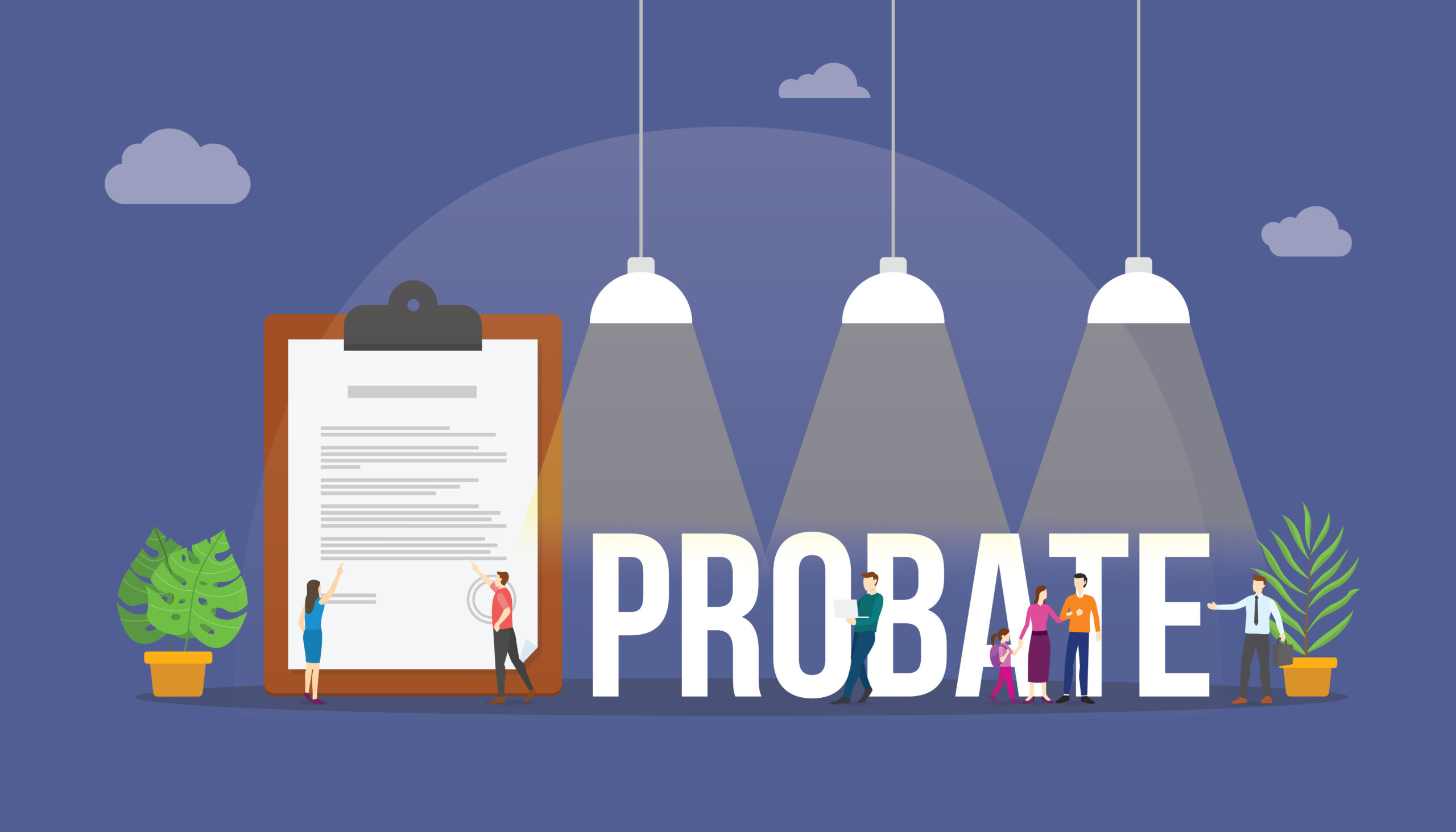Probate in Pennsylvania: How Painful Is It, and Why Does It Take So Long?

When someone passes away, legal responsibilities are likely the last thing on your mind. You need time to grieve and process the loss, and likely don’t have the emotional energy to handle the a lengthy and involved court process. Unfortunately, the process won’t go away, and nothing can be done with the estate until probate is begun.
What is Probate?
Probate is the name of the legal process whereby the estate of a deceased person is administered. If the deceased created a will (known as dying ‘testate’), probate involves the execution of the will. If the deceased did not have a will (known as dying ‘intestate’), then the rules of intestacy will govern how the estate is administered.
Probate involves collecting all of the deceased’s assets, paying their creditors, and then distributing the remaining assets to the beneficiaries. If the deceased had a will, it controls who the beneficiaries are. If the deceased didn’t have a will, the intestacy statutes determine who inherits the assets.
Who Handles Probate?
The person responsible for handling an estate is either known as an administrator or an executor – the term ‘personal representative’ is used to mean either of these roles. If the deceased was intestate, then the person who handles the estate is known as the administrator. If the deceased had a will, the person who handles the estate is known as the executor – so called because they are the person responsible for ‘executing’ the terms of the will.
If the deceased was testate, they will have appointed the executor within their will. The executor can be anyone the deceased chooses, so long as they meet the requirements for the state. In Pennsylvania, the executor can be anyone who is at least 18 years old, and is sound of mind (meaning they haven’t been judged incapacitated by the court). Many states (but not Pennsylvania) also prevent someone who has been charged with a felony from serving as executor.
The person named as executor is not forced into the role. They can always choose to decline the appointment if they don’t want to be responsible for it. Therefore, it is always recommended to have at least one contingent executor named, just in case the primary executor is not willing or able to fulfill the role.
If there is no executor who is able to serve, or the deceased was intestate, then the court will appoint an individual to act as executor or administrator of the estate. This is usually a family member, but it could also be a close friend, or even an attorney if the beneficiaries desire that.
What is Involved in the Probate Process?
At its simplest, probate involves collecting the assets of the deceased, paying their creditors, and making distributions to the beneficiaries. Because the court oversees the process, though, there are a lot of steps to go through along the way.
Qualification and Grant of Letters
First, the executor or administrator must qualify before the court. This means they need to appear and show that they are the person who will be responsible for the estate, whether that is because they are the named executor, or they are the appropriate person to handle the estate of someone who died intestate. As might already be clear, it can be more complicated to qualify for an intestate decedent. You will also need to file the will, if one exists, and the death certificate.
The personal representative must file a Petition for Grant of Letters, which includes paying the appropriate probate fees – determined by the size of the estate. Once the court grants the petition it will supply either Letters Testamentary (if testate) or Letters of Administration (if intestate), which grant authority to the personal representative to handle the estate’s assets.
Notice of Estate Administration and Certification of Notice
The personal representative will need to provide notice to any potential creditor’s that the estate is in probate. Generally this means filing a notice in a locally distributed newspaper or the county legal journal. This starts the clock running on any potential claims against the estate. If you have given notice and a creditor does not make their claim within the statutory period, the debt will no longer be collectable by the creditor.
You will also need to provide notice to all potential beneficiaries that the estate has been opened, and you must provide them with a copy of the will if it exists. Once the beneficiaries have notified according to the rules of the court, you will need to file a certification with the court that all potential beneficiaries and creditors have been notified.
Inventory of Assets
Next, you must gather all the assets and create an inventory of them – you can’t handle probate if you don’t know what the deceased actually had. An accounting is required to be filed with the court, showing all the assets owned by the decedent, and their value on the date of death. The inventory must also include all known debts of the decedent. You will likely have to transfer all assets out of the decedent’s name and into an account in the name of the estate. Depending on the jurisdiction, you may need to get a grant of specific authority to handle matters like selling real estate owned by the decedent.
Statement of Proposed Distributions
Any liabilities of the estate must be paid off before before the beneficiaries receive their inheritance. This includes any debts the deceased owed – utility bills, credit card debt, loans that still have to be repaid, and more. This also includes filing a final income tax for the estate, and paying any inheritance and estate taxes due. While many states don’t have any ‘death taxes,’ Pennsylvania has an inheritance tax which is imposed on almost every asset payable to beneficiaries. The amount of this tax is determined by the relation of the deceased to the beneficiary, and is anywhere from 0% to 15%. Finally, if you are working with a probate attorney to handle the estate, they are also a creditor.
Finally, the beneficiaries will be paid out of what remains in the estate after the creditors are paid. These distributions are made either according to the terms of the will, or according the the intestacy rules. Depending on the complexity of the distribution wishes, this may be as straightforward as splitting the assets into equal shares, or it may involve specific distributions, different classes of inheritors, contingent gifts, distributions in trust, and more.
No money should actually be distributed until it is approved by the court. This is handled through a Statement of Proposed Distributions, which lays out exactly where the assets of the estate will go. Once the court approves the proposed distribution, the executor or administrator can pay out the estate.
Release of Liability
While not strictly necessary, an executor should ask all beneficiaries to sign a release of liability before making any distributions. This ensures that a beneficiary will not turn around and decide to sue the executor for a larger share of the inheritance. If a beneficiary has not signed the form, and chooses to sue after the estate has been distributed, the executor may have to pay out of pocket for any legal expenses. The beneficiary must sign the form before receiving their inheritance, or it won’t be effective.
A refusal to sign the release does not mean the beneficiary forfeits their inheritance – however, the matter must be resolved before any beneficiaries will receive their inheritance. This means that there will be a delay on all distributions made out of the estate.
Distribution and Closure of Estate
Finally, once everything else is finished, and the distributions have been made, the personal representative must formally request that the court close the estate and that they be released from their role. At this point their responsibilities have come to a close, and barring any potential legal action or the appearance of more assets that would necessitate reopening the estate, they can move on.
How Long Does Probate Take?
The length of probate varies from state to state, and really from county to county. In Pennsylvania, there is no statutory deadline for how long the process can take, or even when probate needs to be started for an estate. (Technically the grant of letters has to be within 21 years of the decedent’s death, but the court can waive that if cause is shown.) Generally, expect probate in Pennsylvania to take over a year from the date it is begun.
While there is no time limit to probate as a whole, there are certain deadlines which have been set in Pennsylvania:
First, the Pennsylvania Inheritance Tax must be paid within 9 months of the decedent’s death. And if it is paid within 3 months, there is a 5% discount on the taxes owed.
Once an estate has been opened, the personal representative has 3 months after the grant of letters to notify any potential creditors and beneficiaries that the estate has been opened. They must also file a Certification of Notice within 10 days after giving notice. Once notice has been given, creditors have 1 year to make claims against the estate. Any claims not made within that time are no longer enforceable.
Any debts owed to the estate must be collected within 1 year from the death of the decedent or they will no longer be enforceable.
Someone can challenge the probate within 1 year of its close, although the court can shorten this period to 3 months upon petition.
Expect probate to take at least a year to allow the statute of limitations to run on any creditors claims against the estate. Often it can take longer, particularly if the estate is complicated, or the decedent died intestate. You never know what complications may arise, and if anyone choose to challenge the probate in court, the process could take much longer.
Where Does Probate Take Place?
Probate occurs in the state and county that the deceased resided in at the time of their death. It does not matter if the deceased created their will in another state. Which court handles probate is decided by the laws of the state. In Pennsylvania, probate is handled in Orphans’ Court.
If the deceased owned property somewhere other than their home state, ancillary probate may need to take place there. Ancillary probate is a secondary probate process which specifically disposes of the assets contained in another state. This is necessary because each state has their own laws regarding probate, and their courts must govern that process. Usually the executor of the will also handles ancillary probate. However, the deceased may have named a special executor to specifically to handle the property contained in other states.
What is Included in the Estate?
Non-Probate Property
Probate only covers the assets of an individual that become part of their estate. However, not everything a deceased individual owned at the time of their death is considered part of their estate. Some assets immediately pass immediately to the beneficiaries outside of probate – these assets are given the very imaginative name ‘non-probate property.’
Jointly Owned Assets
There are three primary types of non-probate property. The first is jointly-owned assets with rights of survivorship. Most often this is the case with married couples, where the couple owns their house, vehicles, or various financial accounts jointly. When one spouse passes, the other spouse immediately becomes the sole owner, no probate necessary. (Not all types of joint ownership works this way though – property held as ‘joint tenants in common’ or ‘joint tenants without rights of survivorship’ does not pass outside of probate.)
Beneficiary Designations or Payable on Death Accounts
The second type of non-probate property is anything which contains beneficiary or ‘payable on death’ designations. Life insurance, brokerage accounts, retirement accounts, and (in some states) Transfer on Death deeds are some examples. For this property, all that is needed is to provide proof that the owner is deceased, and the assets are immediately transferred or paid out to the beneficiaries. If no beneficiary designation was ever created, however, this property becomes part of the estate and is administered in probate.
Trust Property
The final type of non-probate property is anything owned by a trust. In some states it is common to create a living revocable trust to hold all of your property. The primary purpose of a living trust is to avoid probate – because the trust was technically the owner of the property, those assets do not get included in the estate of the deceased and do not need to be administered through the court. (Living trusts do not offer any tax or liability advantages – because the individual maintains complete control of the property, it is still considered to be part of their estate for the purposes of the IRS, and can also be reached by creditors.)
Probate Property
‘Probate property’ is everything else – any assets that the deceased owned individually, any physical property, and any accounts without set beneficiaries. All of these assets are handled by the deceased’s will, or by intestacy if they did not create a will during their lifetime.
How Much Does Probate Cost?
Court Fees
There are always fees associated with probate, but how expensive those fees are depends on the laws of the state. Some states, like Pennsylvania, have a relatively low probate fees. Other states, like California, can have very high probate fees. These fees do not include any estate or inheritance tax – those are separate costs which may also need to be paid. These fees also don’t include attorney’s fees.
Part of the the fees associated with probate are the court fees – in order for the court to provide letters of the administration you will need to get access to the assets, you will pay a fee according to the gross value of the estate. You also need to pay fees any time you file one of the required forms for handling the estate. In general, you can expect to pay anywhere from $200 – $1,000 in probate fees. However, this can vary significantly depending on the value of the estate and the county handling probate.
Attorney’s Fees
Most of the fees associated with Probate are actually those paid to professionals helping administer the assets. Usually this means attorney’s fees – but it can also include accountants or other professionals. Attorneys can charge either an hourly rate for their services, a flat rate fee, or they can charge a percentage of the estate.
Some states have laws that regulate what fees attorneys can charge for their services. Pennsylvania has no such statute, but it does have guidance in the form of a 1983 case, Johnson Estate. In Johnson, the judge published a list of reasonable fees for an attorney to charge depending on the size of an estate. These fees can increase quite quickly – an estate worth only $100,000 could reasonably be charged $5,750 for attorney’s fees.
Johnson is not binding, and it is up to the discretion of the presiding judge whether the fees charged by the attorney are reasonable. Often it is worth working with a probate attorney who will charge an hourly rate for their services, as an estate worth $1 million may not be any more difficult to probate than an estate worth $100,000.
Attorneys are paid out of the assets of the estate, not out of the pocket of the personal representative.They also receive highest priority for payments, above any other creditors. This is important because attorneys may not take on probate if they were worried there wouldn’t be any money to pay them after the other liabilities were taken care of.
Executor’s or Administrator’s Fee
The executor or administrator is generally entitled to a fee for their work on the estate. Often they choose to waive this fee, particularly if the estate is being handled by a family member. Like attorney’s fees, there is no statute laying out a reasonable fee, but Johnson provides guidance. According to Johnson, a reasonable fee for an executor or administrator is nearly identical to that for an attorney. However, once again it is up to the presiding judge to make the final determination.
Do You Have to Hire an Attorney for Probate?
It is very common to hire a lawyer to help with the probate process. While the executor or administrator is responsible for handling the estate, they can hire an attorney to help them with the process, and even handle most of the process for them.
You don’t have to hire a lawyer to help with probate if you don’t want to – nothing about the normal probate process requires the representation of an attorney. However, the process can be complicated – the right forms must be filled out and filed on time, there must be an accounting done of the estate, inheritance taxes must be paid, and more.
If that sounds like a lot of work to try and handle on your own, it is a good idea to have a lawyer assist you through the process – you don’t want to make mistakes during process or you could incur more fees for the estate, or even personal liability. A good attorney can give you a reasonable estimate of what it will cost for them to help administer the estate before you begin working with them.
Is Probate Necessary?
Technically, probate is not necessary for every estate. If an estate has no assets, then there is nothing to probate. Even in this instance, it may be beneficial to probate the will with the court, simply to have it on file in case of any complications down the road. For example, if years later someone claims to be a beneficiary and entitled to some of the estate, you can show that the estate was already probated and there were no assets to distribute.
However, in the large majority of cases, probate is necessary. It is very rare that someone doesn’t own a single asset at the time of their death. More often, the estate might be quite small, and in this instances, a small estate affidavit is appropriate.
What is a Small Estate Affidavit?
Most states have some form of express probate for small estates. In Pennsylvania, 20 Pa. C.S.A § 3101 sets the requirements and the process for handling a small estate. In Pennsylvania, if an estate is valued at less than $50,000 (real property and funeral/burial expenses are not counted towards that limit), it qualifies as a small estate and can be processed much quicker.
If the estate qualified, than a small estate petition will allow the personal representative to handle all of the probate requirements in a single petition. The court will review the petition, and then give authority to distribute the estate, or ask the personal representative some more questions. Either way, the small estate process is a much quicker way of getting through probate when an estate qualifies.
Can Probate Be Avoided?
As mentioned above, if a decedent did not have any probate property, then probate is not technically necessary. You can accomplish this by creating a revocable living trust during your lifetime, and making sure that the trust is the owner of all your assets. This does not have any tax or liability benefits, but it does allow you to avoid probate.
However, probate is not all that difficult in Pennsylvania compared to other states, and most of the fees associated are not specifically probate fees – they are attorney’s fees and other similar fees, which are still necessary whether you go through probate or not. A living trust can keep the estate out of probate, but it requires careful maintenance to make sure that the trust is the actual owner of all assets. They are also more expensive to set up.
In some situations, such as owning real property in another state, living trusts can be very beneficial, but they usually are not necessary in Pennsylvania. A good estate planning attorney will discuss the pros and cons of trusts with you honestly to determine whether it makes sense for you to set one up.
What About Probate Litigation?
If someone chooses to sue, probate becomes a much longer, much more expensive process. As with any lawsuit, there are a lot of steps between the beginning of a lawsuit and it’s conclusion – far too many to get into here. However, if you are representing an estate being sued, or are considering suing an estate, you should always speak to an attorney.
If you are considering suing, you must make sure that you are not jeopardizing your own inheritance. It is common practice to include a ‘No-Contest Clause” in wills, which states that if anyone files a lawsuit against the estate, they are not entitled to any of the assets which they would otherwise inherit. This is done to discourage lawsuits so the estate can be closed. While you may benefit if you succeed in the lawsuit, you are also at risk of losing everything.
If you are defending against a lawsuit, you want to make sure that you are protected as the representative of the estate, and will not be personally liable for any potential judgments. The estate itself should cover the costs of the litigation, so that you don’t need to pay out of pocket to hire a lawyer.
Conclusion
What probate looks like can vary greatly from one estate to another. Even in the best cases, unless you are filing a small estate affidavit, expect the process to take at least a year from start to finish. The process can be exhausting because each step must be carefully followed or you risk incurring fees, or exposing the estate or even yourself to liability.
Probate is complicated, but you don’t have to deal with it on your own. If you have to handle an estate, you should have a probate attorney to help you navigate the complex processes and represent your best interests along the way. Reach out today to get started on that process.

If you are looking at starting probate, or are already in the midst of it and need help, I am happy to have a free, no obligation, consultation with you. You can call me anytime at 215-360-3139, or click the button below to schedule a time for me to call you.

If you are looking at starting probate, or are already in the midst of it and need help, I am happy to have a free, no obligation, intake call with you. Click the button below to schedule a time for me to call you.

